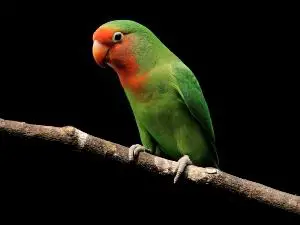
Vomiting of any kind is unnatural, this is true for animals and for humans as well. So you’d understandably be worried if your lovebird suddenly starts vomiting clear liquid.
This article is a look into why your lovebird is vomiting clear liquid.
Table of Contents
Lovebird vomiting clear liquid:
Birds try their best to hide signs that they are ill but if the bird is sick enough or if the symptoms of the illness are severe enough then the bird won’t be able to hide the signs of being ill.
This is what you need to know about lovebirds vomiting:
Regurgitation vs vomiting:
What you see as vomiting in your bird may actually be regurgitation, birds of all types will do this and it is quite normal and is nothing to worry about
Birds regularly regurgitate the food that they eat into the mouths of their loved ones or regurgitate the contents of their crop onto surfaces.
The difference between regurgitation and vomiting is that vomiting is the forceful expulsion of food from the bird’s mouth.
A bird that is vomiting will flick the contents of its mouth all over the place aggressively. Vomiting causes the bird to forcibly shake its head before it spits out the liquid causing the liquid to flick all over the cage.
If the bird is regurgitating, it will calmly bring the food, or mucus, up from its crop and place it in the mouth of another bird or onto a surface.
A bird that is regurgitating will bob its head up and down before regurgitating and after the regurgitation the bird will simply go about its normal routine and business.
While both may look odd only one is dangerous and that is the bird vomiting. Regurgitation will be observed in your bird a few times while vomiting will be new and sudden.
What to do:
You need to first figure out if the bird is actually vomiting the clear liquid that you see or if it is expelling the clear liquid by regurgitating it.
Stay calm and observe the bird to see what it is doing. Let the bird do what it needs to do and don’t interfere with the bird as it does this.
If the bird is indeed vomiting then it is likely ill and has some sort of infection, here is what you need to know about bird infections and vomiting
The bird has an infection:
Your bird may be vomiting because it is infected with bacteria, certain bacteria can colonize your lovebird’s crop and cause the mucous membrane of the bird’s crop to become inflamed and produce a lot of mucous.
This large amount of mucous may be what you are seeing as the clear liquid being vomited by your lovebird.
The vomiting will thus be a symptom of the infection that your bird is suffering from, it’s important to note that this inflammation is not only caused by bacteria but it can be caused by nothing at all as well, and can happen for no apparent reason,
What to do:
Because there are a variety of infections that your bird may be suffering from it is recommended that you take the bird to the vet to be diagnosed and given treatments, that is, if treatments for your bird’s condition are available.
The vet will run different tests on the bird depending on how severely your bird is vomiting and based on any of the other symptoms that your bird has.
The vet may also ask you about your bird’s history, eating habits, and environment to help diagnose the bird.
Not only will the vet perform a physical exam on the bird to help diagnose it, the vet may also need to do a biochemistry panel, a complete blood count, take a sample of the bird’s crop and feces for a bacteria culture and do an endoscopy as a way of seeing inside the birds intestinal tract.
If the bird has a bacterial infection then antibiotics will be given to treat the bird, and fluids may also be given to the bird to rehydrate it if needed.
If the bird’s intestinal tract is damaged, or at risk of being damaged, then the vet may give the bird medications to protect the bird’s intestinal lining.
Give the bird its medications just as the doctor ordered even if it seems that the bird’s symptoms are gone.
You may not be able to get the bird to the vet immediately, if this is the case then you can isolate the bird and give it its own food and water to keep the bird from infecting other birds.
Also, keep the bird in a warm environment as it recovers.
If you enjoyed this article then you may also be interested in other bird related articles. Here are some articles that you may be interested in: Conure Vomiting Clear Liquid, Cockatiel Vomiting Clear Liquid, Why Do Birds Fall Off Their Perch, Budgie Throwing Up Clear Liquid

